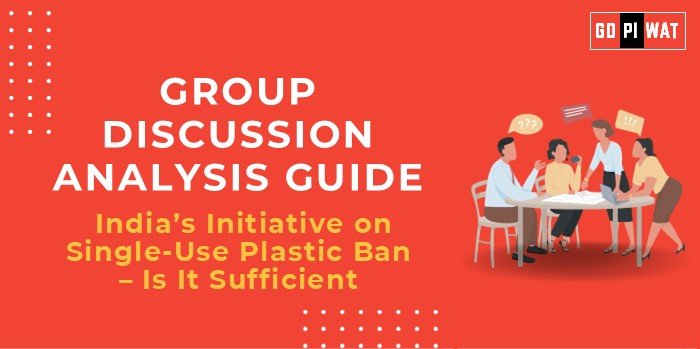🌱 Group Discussion (GD) Analysis Guide
🌍 Topic: India’s Initiative on Single-Use Plastic Ban – Is It Sufficient?
📜 Introduction to the Topic
Opening Context: “With rising global concerns about environmental degradation, India’s ban on single-use plastics (SUP) represents a significant step in tackling plastic pollution. However, the effectiveness of this initiative remains debatable.”
Topic Background: Introduced in 2022, the Indian government’s ban on 19 single-use plastic items aims to reduce non-biodegradable waste that clogs rivers, pollutes oceans, and threatens wildlife. The initiative aligns with global sustainability goals, including the UN’s Sustainable Development Goals (SDG 12 and 13).
📊 Quick Facts and Key Statistics (Updated)
- 🌍 Plastic Waste Generation in India: ~4.13 million tons annually, with 60% mismanaged.
- ♻️ SUP Contribution: Accounts for 36% of global plastic waste.
- 🚫 Ban Implementation: 19 SUP items prohibited since July 2022.
- 🔄 Recycling Rates: India recycles approximately 60% of its total plastic waste, but a significant portion of SUP remains non-recyclable.
- 🌐 Global Comparison: Over 60 countries have restrictions on SUP use, including China, Canada, and EU nations.
👥 Stakeholders and Their Roles
- 📜 Government: Enforces bans, provides incentives for alternatives, and monitors compliance.
- 🏭 Manufacturers: Transition to sustainable materials, including biodegradable and reusable plastics.
- 👨👩👧👦 Consumers: Responsible for adoption and compliance with eco-friendly practices.
- 🌱 NGOs and Environmental Groups: Promote awareness and advocate for stronger enforcement.
- 🌍 International Bodies: Offer frameworks like UNEP’s Global Plastic Pollution Initiative.
🎯 Achievements and Challenges
🎉 Achievements:
- 📜 Legislative Action: One of the first large-scale SUP bans in a developing economy.
- 📣 Increased Awareness: Nationwide campaigns have highlighted the environmental impact of plastics.
- 💡 Innovation: Growth in alternatives like biodegradable packaging and plant-based plastics.
- 🏞️ Regional Success Stories: Kerala and Himachal Pradesh have seen significant reductions in SUP usage.
⚠️ Challenges:
- 🔍 Implementation Gaps: Limited monitoring and enforcement, especially in rural areas.
- 💼 Economic Impact: Disruption to small businesses reliant on affordable SUP packaging.
- 💸 Lack of Alternatives: High costs and limited availability of eco-friendly options.
- 🌍 Global Comparisons: Countries like Rwanda and Kenya have achieved near-total bans, showcasing stronger enforcement frameworks.
📜 Structured Arguments for Discussion
- Supporting Stance: “The SUP ban is a pivotal step in India’s green transition, aligning with global sustainability goals and reducing environmental degradation.”
- Opposing Stance: “Without robust enforcement and viable alternatives, the ban risks being superficial, disproportionately affecting small businesses.”
- Balanced Perspective: “The ban’s success depends on addressing enforcement gaps and fostering innovation in sustainable alternatives.”
📈 Effective Discussion Approaches
- Opening Approaches:
- 📊 “With India generating ~4.13 million tons of plastic waste annually and 60% of it mismanaged, the single-use plastic ban is a crucial step in environmental conservation.”
- 🌐 “Over 60 nations, including China and Canada, have implemented SUP restrictions, positioning India’s efforts within a global context.”
- 💡 “Single-use plastics contribute 36% to global plastic waste, underscoring the need for strong policy actions like India’s ban.”
- Counter-Argument Handling:
- 🌱 Highlight local success stories to counter claims of ineffectiveness.
- 🤝 Discuss public-private partnerships as a solution for cost-effective alternatives.
- 📊 Emphasize the environmental cost of inaction with relevant data.
🔧 Strategic Analysis of Strengths and Weaknesses
- Strengths: Environmental benefits, growing consumer awareness, alignment with global goals.
- Weaknesses: Limited enforcement, economic strain on SMEs, insufficient alternatives.
- Opportunities: Innovation in green packaging, public-private collaborations, export potential for eco-friendly products.
- Threats: Black markets for banned items, resistance from industries, global plastic dumping.
📚 Connecting with B-School Applications
- Real-World Applications: Projects on sustainable supply chains, case studies on green business models, or analyzing policy frameworks.
- Sample Interview Questions:
- 💼 “How can India balance environmental goals with economic realities in banning SUP?”
- 🌍 “Evaluate the effectiveness of global SUP bans compared to India’s.”
- Insights for B-School Students:
- 🌱 Explore opportunities in sustainable innovation, policy analysis, and ESG (Environmental, Social, Governance) compliance frameworks.


